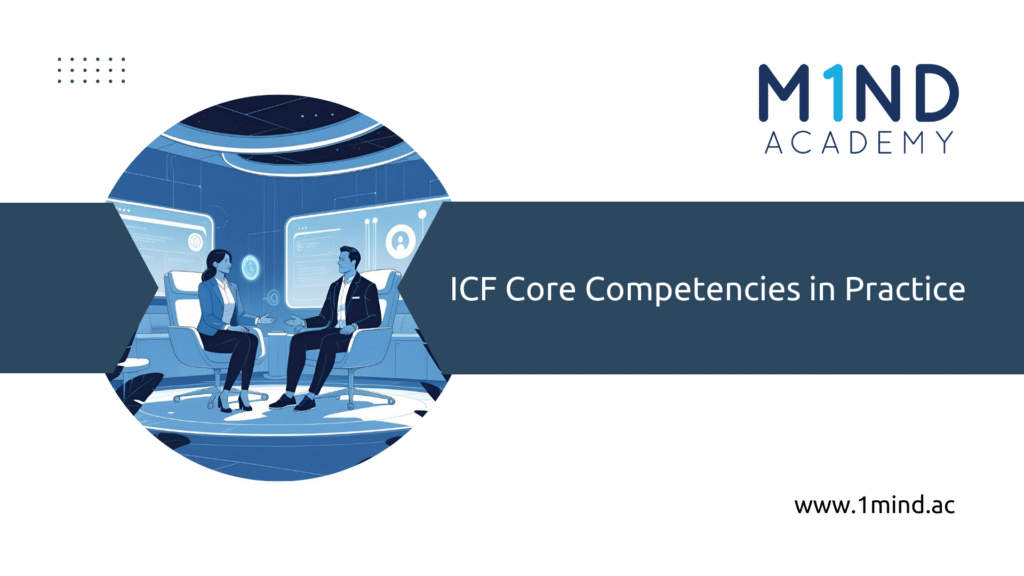Core Competencies in Practice
Course Content
A. Foundation
B. Co-Creating the Relationship
C. Communicating Effectively
D. Cultivating Learning and Growth
Bonus Material
1. Demonstrates Ethical Practice
You don't currently have access to this content
4 Topics
1 Quiz
1.1 Introduction
You don't currently have access to this content
1.2 Video
You don't currently have access to this content
1.3 Summary
You don't currently have access to this content
1.4 Recommended Readings and Resources
You don't currently have access to this content
Quiz 1 – CC1
You don't currently have access to this content
2. Embodies a Coaching Mindset
You don't currently have access to this content
4 Topics
1 Quiz
2.1 Introduction
You don't currently have access to this content
2.2 Video
You don't currently have access to this content
2.3 Summary
You don't currently have access to this content
2.4 Recommended External Readings & Resources
You don't currently have access to this content
Quiz 2 – CC2
You don't currently have access to this content
3. Establishes and Maintains Agreements
You don't currently have access to this content
4 Topics
1 Quiz
3.1 Introduction
You don't currently have access to this content
3.2 Video
You don't currently have access to this content
3.3 Summary
You don't currently have access to this content
3.4 Recommended External Readings and Resources
You don't currently have access to this content
Quiz 3 – CC3
You don't currently have access to this content
4. Cultivates Trust and Safety
You don't currently have access to this content
4 Topics
1 Quiz
4.1 Introduction
You don't currently have access to this content
4.2 Video
You don't currently have access to this content
4.3 Summary
You don't currently have access to this content
4.4 Recommended External Readings and Resources
You don't currently have access to this content
Quiz 4 – CC4
You don't currently have access to this content
5. Maintains Presence
You don't currently have access to this content
4 Topics
1 Quiz
5.1 Introduction
You don't currently have access to this content
5.2 Video
You don't currently have access to this content
5.3 Summary
You don't currently have access to this content
5.4 Recommended External Readings and Resources
You don't currently have access to this content
Quiz 5 – CC5
You don't currently have access to this content
6. Listens Actively
You don't currently have access to this content
4 Topics
1 Quiz
6.1 Introduction
You don't currently have access to this content
6.2 Video
You don't currently have access to this content
6.3 Summary
You don't currently have access to this content
6.4 Recommended Readings & External Resources
You don't currently have access to this content
Quiz 6 – CC6
You don't currently have access to this content
7. Evokes Awareness
You don't currently have access to this content
4 Topics
1 Quiz
7.1 Introduction
You don't currently have access to this content
7.2 Video
You don't currently have access to this content
7.3 Summary
You don't currently have access to this content
7.4 Recommended External Readings & Resources
You don't currently have access to this content
Quiz 7 – CC7
You don't currently have access to this content
8. Facilitates Client Growth
You don't currently have access to this content
4 Topics
1 Quiz
8.1 Introduction
You don't currently have access to this content
8.2 Video
You don't currently have access to this content
8.3 Summary
You don't currently have access to this content
8.4 Recommended Readings & Resources
You don't currently have access to this content
Quiz 8 – CC8
You don't currently have access to this content
9. The Evolution of the ICF Core Competencies (2019-2025)
You don't currently have access to this content
3 Topics
1 Quiz
9.1 Introduction to ICF Core Competencies (2019-2025)
You don't currently have access to this content
9.2 Video – ICF Core Competencies (2019-2025)
You don't currently have access to this content
9.3 Summary – ICF Core Competencies (2019-2025)
You don't currently have access to this content
Quiz 9 – Bonus
You don't currently have access to this content

